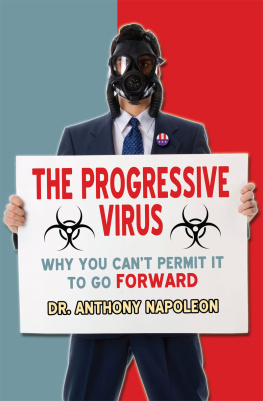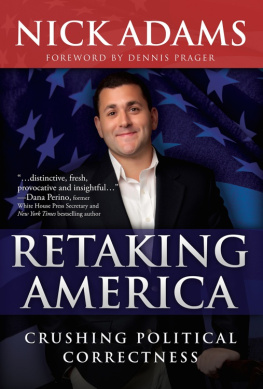The Progressive Virus: Why You Cant Permit it to Go Forward, by Anthony Napoleon. ISBN 978-1-62137-130-4 (Softcover), 978-1-62137-137-3 (Hardcover), 978-1-62137-138-0 (eBook).
Published 2012 by Virtualbookworm.com Publishing Inc., P.O. Box 9949, College Station, TX 77842, US.  2012, Anthony Napoleon. All rights reserved. No part of this publication may be reproduced, stored in a retrieval system, or transmitted in any form or by any means, electronic, mechanical, recording or otherwise, without the prior written permission of Anthony Napoleon.
2012, Anthony Napoleon. All rights reserved. No part of this publication may be reproduced, stored in a retrieval system, or transmitted in any form or by any means, electronic, mechanical, recording or otherwise, without the prior written permission of Anthony Napoleon.
Manufactured in the United States of America.
CHAPTER ONE
Introduction and History
T HIS IS A BOOK ABOUT an epidemic infecting America and much of the Western world. The epidemic I make reference to is not some rogue virus or genetically engineered bacterium. The sickness infecting America involves the widespread adoption of a psychological belief system. This belief system is named progressivism.
Progressivism declares that no objective reality exists but for the perception of man. It assumes that man is born as a tabula rasa and that his environment, which is characterized by social injustice, accounts for why some people do not achieve financial and social wealth. Progressives believe that those who do achieve financial and social wealth have done so by directly or indirectly oppressing the have-nots. Progressivism seeks to restore the inequity between the haves and the have-nots by deemphasizing equal opportunity in favor of government enforced equal outcomes, regardless of merit, talent, effort or inheritance. Citizens sense of entitlement is fundamental to the progressives notion of social justice.
Progressivism did not appear overnight but developed incrementally as men changed their notions about life itself. An early iteration of progressivism undoubtedly appeared naturally during the dawn of man, but never fully developed, nor did it spread to infect large portions of the population due to immune system barriers and no efficient way that others could be easily infected en masse.
The immune system barriers that protected early man were comprised of barrier realities, e.g., the need for food, shelter, clothing and the presence of natural competition. These realities consumed the undivided attention of early man. Philosophical notions necessarily took a back seat to fending off predators, scavenging for food and dealing with life and death on a daily basis. It is no coincidence that the idle rich generated the first iteration of the progressive virus.
Rene Descartes was an early developer of the progressive virus who wrote some of its first DNA code in the mid-17 th century. Descartess declaration: Je pense donc je suis; (I think, therefore I am) became a core building block of progressivism. Descartes wrote:
I have convinced myself that there is absolutely nothing in the world, no sky, no earth, no minds, no bodies. Does it now follow that I, too, do not exist? No. If I convinced myself of something [or thought anything at all], then I certainly existed. But there is a deceiver of supreme power and cunning who deliberately and constantly deceives me. In that case, I, too, undoubtedly exist, if he deceives me; and let him deceive me as much as he can, he will never bring it about that I am nothing, so long as I think that I am something. So, after considering everything very thoroughly, I must finally conclude that the proposition, I am, I exist, is necessarily true whenever it is put forward by me or conceived in my mind.
Descartes had the time and resources to be fascinated with the proposition that he caused his own existence. His fascination with such matters was not readily contagious because, in part, existent French and English mores functioned as a natural barrier to the fledgling virus he was helping to create. Notably, Englishmen John Locke and Thomas Hobbes had erected barriers to the virus. Locke imbued thinkers of the 17 th century with the anti-progressive notion of inalienable rights. Lockes God given rights included life, liberty and property. Hobbes argued for the notion that man was free (naturally) to engage in behavior not explicitly prohibited by law. The importance of declaring that man was free was remarkable for its time, given the dominance of the British monarchy and the French ruling class.
The 18 th Century produced thinkers who constructed fire walls to the fledgling virus in their midst. Important immune system boosters included Charles Montesquieu and Voltaire. These men disrupted the viruss ability to replicate.
Montesquieu espoused the idea that governments should be separated into three branches; the executive, legislative and judicial. His tri-part governmental thesis was designed to serve as a structural limit on what would turn out to be a necessary component of a widespread progressive infection: centralized power.
Voltaire advocated for the preeminence of the individual, not the collective. He asserted that man had a God given right to a free trial and freedom from state mandated religions. Whenever man believes that his rights come from God and not from governments, the viruss ability to replicate is limited.
It is no coincidence that the relative dormancy of the progressive virus and the genesis of America took place in roughly the same time frame. Americas founders took much of their positive inspiration from Locke, Montesquieu, Voltaire and Hobbes. For example, compare these two passages, one from Thomas Jeffersons contribution to the Declaration of Independence and one from John Lockes Second Essay, published in 1693. First John Locke:
Secondly: I answer, such revolutions happen not upon every little mismanagement in public affairs. Great mistakes in the ruling part, many wrong and inconvenient laws, and all the slips of human frailty will be borne by the people without mutiny or murmur. But if a long train of abuses, prevarications, and artifices, all tending the same way, make the design visible to the people, and they cannot but feel what they lie under, and see whither they are going, it is not to be wondered that they should then rouse themselves, and endeavor to put the rule into such hands which may secure to them the end for which government was at first erected...
Thomas Jefferson, The Declaration of Independence, 1776:
Prudence, indeed, will dictate that Governments long established should not be changed for light and transient causes; and accordingly all experience hath shown, that mankind are more disposed to suffer, while evils are sufferable, than to right themselves by abolishing the forms to which they are accustomed. But when a long train of abuses and usurpations, pursuing invariably the same Object evinces a design to reduce them under absolute Despotism, it is their right, it is their duty, to throw off such Government, and to provide new Guards for their future security.
Later in the 18 th century the nascent progressive virus reemerged with the help of Rousseau. He wrote some of the more important code for the virus. Rousseau advocated that citizens and governments should emphasize the collective, not promote individual liberty and freedom. Rousseau argued against a citizens right to own property. Rousseau supported creating a centralized government with the power to redistribute wealth to achieve collective justice, an early iteration of what would come to be known as social justice.
The dawn of the 19 th century ushered in an ever-strengthening virus. August Comte laid the foundation for what would become secular humanism when he created a new religion known as The Religion of Humanity. Still, his belief in objective good and bad, along with his desire to live a virtuous life, protected him from many of the debilitating effects of the virus he was helping to create.
Next page














 2012, Anthony Napoleon. All rights reserved. No part of this publication may be reproduced, stored in a retrieval system, or transmitted in any form or by any means, electronic, mechanical, recording or otherwise, without the prior written permission of Anthony Napoleon.
2012, Anthony Napoleon. All rights reserved. No part of this publication may be reproduced, stored in a retrieval system, or transmitted in any form or by any means, electronic, mechanical, recording or otherwise, without the prior written permission of Anthony Napoleon.